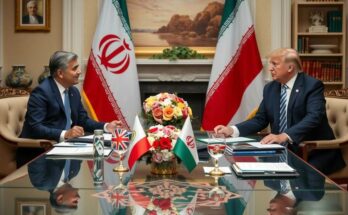The longstanding feud between Egypt and Ethiopia over the Nile escalates into an arms race in Somalia, impacting regional cooperation against terrorism. Egypt has begun supplying arms to Somalia and plans to send troops, alarming Ethiopia, which perceives this as a threat to its security. Tensions have also risen due to Ethiopia’s military presence in Somalia and arms shipments to Puntland, leading Somalia to refute these actions as violations of its sovereignty. As relationships among these nations evolve, the stability of the region is increasingly at risk.
A protracted conflict has arisen between Egypt and Ethiopia, primarily over the Nile River, which has now escalated into an arms race centered in Somalia. Somalia has asserted its sovereign right concerning the shipment of arms and the presence of foreign troops, yet Ethiopia perceives this initiative as a substantial threat to its national security, especially with Egypt emerging as a new ally to Somalia. The backdrop of this situation is marked by Ethiopia’s ongoing tension with Egypt regarding the Grand Ethiopian Renaissance Dam (GERD), a contentious project that has become a focal point of diplomatic strife. Recently, Egypt has begun to supply military equipment to Somalia and intends to send troops to assist Somali security forces beginning early next year. This military aid includes shipments of arms to the Port of Mogadishu, which Egypt claims are meant to bolster the Somali military’s capacity. Meanwhile, Ethiopia, already present in Somalia as part of the African Union Transition Mission, views the introduction of Egyptian arms as dangerous and potentially beneficial to the militant group al-Shabaab. The dynamics of this situation have been exacerbated by Ethiopia’s past arms shipments to the Puntland region, which led to Somalia declaring these actions as violations of its sovereignty. Somali officials have requested regional and international support to halt what they perceive as transgressions by Ethiopia. Furthermore, relations have soured considerably since Ethiopian Prime Minister Abiy Ahmed signed a Memorandum of Understanding with Somaliland that Somalia considers an infringement on its territorial integrity. Consequently, Somalia has sought to exclude Ethiopian troops from future mission plans while favoring Egyptian involvement. A potential shift in alliances is unfolding, whereby historical ties between Somalia and Ethiopia are strained, prompting calls for a reevaluation of regional partnerships. Through these events, the potential for instability in the Horn of Africa emerges, underscoring the intricate interplay of national security, sovereignty, and regional dynamics.
The tension between Egypt and Ethiopia is primarily rooted in competing interests concerning the Nile River’s resources. The Grand Ethiopian Renaissance Dam (GERD) has become a point of significant contention, leading to heightened distrust and diplomatic friction between the two states. This dispute has been compounded by Ethiopia’s military involvement in Somalia and its support for Puntland, which Somalia claims infringes on its sovereignty. Egypt’s recent military assistance to Somalia signifies a shift in regional alliances and is perceived as a strategic maneuver to counter Ethiopia’s influence.
In summary, the arms race involving Egypt and Ethiopia in Somalia highlights the delicate balance of power in the Horn of Africa. As both nations vie for influence, Somalia finds itself at a strategic crossroads, caught between traditional alliances and emerging threats. The future of regional stability hinges on the resolution of these conflicts and the commitment of involved parties to respect national sovereignty and collaborate in combating terrorism.
Original Source: nation.africa




